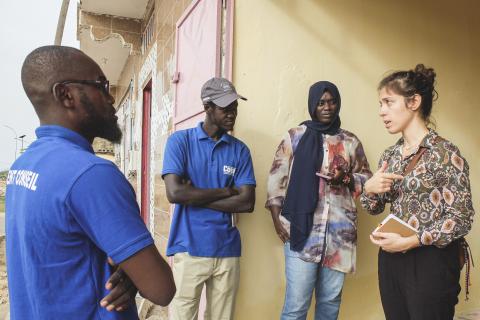
“Working with ADA is a major asset in ensuring the management and viability of solar mini-power stations in rural areas”

Interview with Abdoulaye Ba, founder and director of Coseer Energy (Compagnie Sahélienne en Energie Renouvelable et Efficacité Energétique).
Can you tell us about Coseer and your background?
My name is Abdoulaye Ba and I’m an engineer. I trained in Germany and I am specialised in renewable energy. After working in the wind and solar energy sectors for a number of years, I founded Coseer Energy 10 years ago, with the aim of developing renewable energy in Senegal.
Our company is actively involved in the national rural electrification programme. About three years ago, Coseer signed a contract with the government to manage the operation and maintenance of some 61 solar mini-power stations in remote areas such as Matam and Tambacounda. These facilities provide electricity to places where conventional grids cannot reach. Thanks to a partnership with ADA, we are structuring the way in which the power stations are managed and are supporting our customers - households, small businesses and farms - in the development and financing of green energy projects.
Our activities directly benefit around 46,000 persons and have avoided more than 6,000 tonnes of CO2 since the company was launched.
What motivated you to set up this company?
After my studies and career in Germany, I realised that the big challenge for renewable energy was in Africa. In 2010, I decided to return to Senegal, convinced that my expertise would be more useful here. I started out as a consultant to better understand the regulatory framework and test pilot projects with mini power plants.
At the time, there was little interest in renewable energies. The relevant legislation wasn't passed until 2020. Despite this, I persisted and waited for awareness to take hold. Today, renewable energies account for 30% of Senegal’s energy mix and the state favours rural mini-power stations to reduce the costs associated with expanding traditional networks to isolated areas.
How do you collaborate with ADA?
Our collaboration with ADA is a major asset in managing these plants and in ensuring their viability. ADA's financial and technical support has enabled us to recruit a skilled team, with a particular effort made to integrate women into a traditionally male sector.
ADA is also helping us to raise awareness among small entrepreneurs about the use of energy-saving equipment and access to finance for such equipment.
ADA has also financed feasibility studies. This has given us an in-depth understanding of the needs and opportunities in the areas in which we operate, making our interventions more targeted and effective.

What are your main challenges? How do people perceive solar energy?
The first challenge is cultural. For many rural communities, solar energy is still seen as a temporary solution until the national grid arrives. We need to convince them that solar power can be a sustainable and reliable alternative, but that's difficult because our mini power stations can't always meet electricity demand 24 hours a day. Fortunately, the government is working to increase their capacity to better meet needs.
Another challenge is recruiting qualified staff in the villages. Many young people who trained in cities are reluctant to return to villages because conditions there are so harsh. We are working with institutes in rural areas to recruit technicians locally and offer them attractive conditions.
Climatic conditions are also a major constraint, especially when it comes to accessing isolated sites during the rainy season. We have given our staff motorbikes to make it easier for them to get around and provide better support to communities.
Lastly, we are trying to stimulate the productive use of energy. Our agents identify artisans who could improve their activities by using electrical equipment. For example, in the village of Alana, we are helping a baker to finance an electric mixer, and we are doing the same for other trades such as welding and vulcanisation. This type of project promotes economic development while increasing energy consumption, which is essential for the viability of the mini-power stations.
How is Senegal positioning itself in the field of renewable energy, and what is the outlook?
Senegal is a leader in solar energy in West Africa. In July 2023, Senegal entered into a ‘Just Energy Transition Partnership’ (JETP) with France, Germany, the United Kingdom, Canada and the European Union. Under this partnership, Senegal is committed to increasing the share of renewable energies in its energy mix to 40% by 2030.
Many countries are looking to our model for inspiration. Thanks to the falling cost of solar panels and technological advances in storage, solar energy is becoming increasingly competitive, especially in rural and isolated areas.
For cities, we are working on residential solar kits installed on roofs to meet daytime energy needs. We are also investing in battery recycling, an initiative that is still rare in Africa but essential to limit the environmental impact of these technologies.